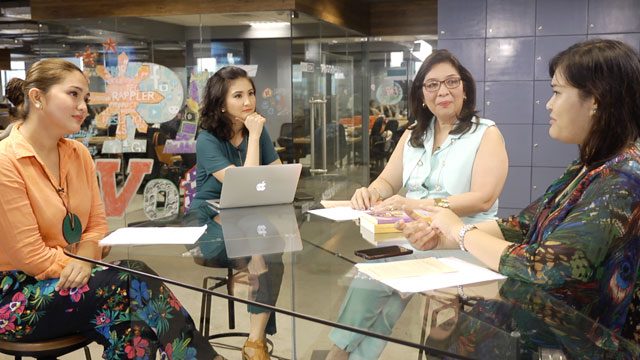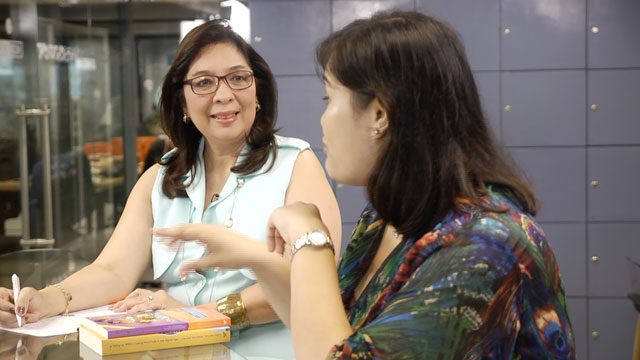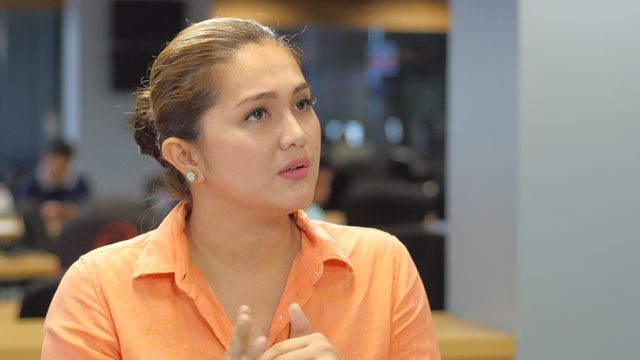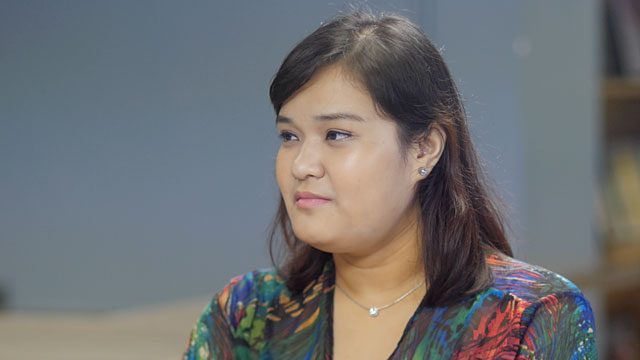SUMMARY
This is AI generated summarization, which may have errors. For context, always refer to the full article.

MANILA, Philippines — “When a child is born, the parent is born at the same time,” Dimples Romana, actress, entreprenuer, and mother of two, said when asked for tips on how one can prepare for child-rearing.
“I think you can never, ever be prepared for something like motherhood,” she continued. “It just comes out naturally, and we all have been blessed with that instinct on how we’re going to mother our children.”
Romana was one of the guests of a roundtable discussion hosted by Rappler last Thursday, June 24 in partnership with Tang on the challenges of modern-day parenting. With Romana were Maribel Dionisio, family and relationship consultant and mother of three grown kids; and Raisa Tan, managing editor, radio show host, and single mother to two kids. Meanwhile, Rica Peralejo-Bonifacio, actress, host, and mother of one boy, moderated the discussion.
There’s no better place to start parenting than at home, and no better time than when the children are still young. Whatever they learn at home, they’ll carry with them when they finally set foot outside house. This is why it’s vital for them to be educated only things that will turn them into upstanding members of society.

Different strokes for different folks
Generally, there are four parenting styles, Dionisio said: autocratic, permissive, democratic, and a combination of these styles. Dionisio raised all her children with the democratic style, which she encouraged other parents to follow.
“We lead, but we also listen. [It’s] still respectful, and we attend to the needs of our kids. We don’t spank, we don’t scream. We talk a lot, there’s a lot of communication,” she said.
Like Dionisio, Romana practices this same style, particularly with her older daughter who’s turning 13 this year, and the authoritative style with her 1-year old son to guide him and “to set the foundations of respect, trust, and all those things that he has to learn while he’s still very young.”
“I think our parenting styles also are influenced by how we grew up, how we were raised. We take in the good, we take out the bad,” she said. “As for me, we were really guided upon having an example like my papa and my mama to really be resilient in times of adversities.”
For Tan, she likened her technique to that of TV character Lorelai Gilmore of “Gilmore Girls” as she tries to be her sons’ best friend.
“Especially since they’re boys and I’m a girl, I’m a mom, I need them to know that no matter what you’re going through as a boy, you can always come to me,” Tan said. “There are certain topics na talagang pang-men na [that are really for men that are], unfortunately, what we lack in our household. So I need them to know that no matter what, no matter how manly that thing is, you come to me.”
All three women also acknowledged the impact that their respective careers have over their parenting styles.
Romana’s biggest challenge as a celebrity mom is to have her kids avoid feeling entitled. At home, she makes sure to spend as much time as she can with them — stripping off her artista side while doing so.
For Tan, it was juggling a 9 to 5 job and radio show gig, all while caring for two young boys.
And for Dionisio, it’s removing the counselor mindset and just being a mother to her kids, as well as making them feel that they don’t have to be a certain way.
The discussion also touched on the role of technology in modern-day parenting. Romana said that while technology allows her to be closer to her fans, its use by children should be regulated and guided. Her daughter Callie, for instance, has thousands of followers on Instagram so she tells her to be more responsible in using social media without subjecting her to any pressure.
Meanwhile, Tan remembered being happy even without gadgets as a kid, even wondering, “What am I doing wrong?” As much as she tries to limit her kids’ use of gadgets, she knows that their exposure to it is unavoidable outside the home.
To this, Dionisio, whose children grew up without cable television and were content with it, said that families must know what their values are. She stressed the importance of parents explaining to their children why they’re setting these limitations so that they would not end up harboring resentment to their parents.

The dangers of parent-judging
Parent-judging has been around for quite some time, and the emergence of social media has only amplified this a hundredfold. There’s always more than meets the eye. And in the case of parenting, this couldn’t be any truer.
When they were younger, Romana’s sister battled leukemia for 3 years. And with her mom having her hands full taking care of her sister, Romana had to prepare for school all by herself. It was something that she understood, young as she was, even though other parents weren’t as understanding. They’d see her with her shoelaces tied the wrong way or having no baon, and quickly assume that her parents weren’t taking care of her.
“I’m like, no, because my mom is going through something at home and I would rather just do everything on my own to help her out,” Romana said. “When your family is exposed to something as grave as cancer, you have to adapt. And somehow, when I was smaller, nadala ko ‘yon [I carried it with me] even until now.”
And when Romana had her first child at 19, people were so sure that she couldn’t pull it off and were not even shy to tell her this.
Tan also shared her own experience, which prompted her to write her piece, “Yes, I Am The Mother Of That Child.” Her youngest, a 7-year-old boy, took the brunt of his parents’ relationship falling apart.
“When you’re a child, you don’t know how to process it well. And I’m not excusing his angry behavior, because what happened was he’d lash out. He’d hit other children, he’d walk out of class… like, the epitome of the evil child, the child you do not want to mess with. And unfortunately, I was the mom,” she said.
“So the brunt of parent-judging, I would feel as soon as I stepped into the school. As soon as I stepped out of the elevator. Wala pa ‘kong nasasabi [I haven’t said a word], I already feel everyone’s eyes on me.”
It’s human nature to judge, said Dionisio, and so parents would need to tune the negativity out. She advised parents to stay from overly critical people and build self-worth so that they’ll be able to not only shield themselves from judgment but also give strength to their children.
Peralejo opined that while parent-judging might not be fixed, parents can still find ways to guard themselves from it.
For her part, Romana said that she finds empowerment from other women who share the same experiences as her. She also said that comments and criticisms must be delivered in a way that one would want it delivered to them – not mean, but lovingly.
Meanwhile, Tan said that she has already learned when to listen and “when to just graciously nod my head.”

Becoming the best parent for your child
Traditionally, when children misbehave, their parents punish them by shouting at or even hitting them. Dionisio strongly discouraged these as these can have negative effects to kids.
Instead, she encouraged parents use consequences, to talk to counselors, to read parenting books, and to spend time with their children by going on one-on-one dates to know them and understand their specific needs better.
Even parents, Dionisio said, should maintain a good, loving relationship, saying: “Our kids will be as good as our marriage. And if we’re a single parent, it will be as good as how we feel about ourselves, our confidence in ourselves.”
Building up the basic foundation of values of respect, trust, discipline, and fear of God is important, Romana said, and she made sure to do this with her own brood. Like Dionisio, she also stressed the value of spending time with the children doing even the simplest yet fulfilling activities at home like cooking, eating, and drawing and coloring.
“When you’re with them, just be there with them,” she added.
Tan, for her part, said that it’s important to build the child’s self-worth, citing getting failing grades despite studying hard for exams as an example.
“I need him to know that he’s not a number. That he’s my son,” she said.
She also stressed on the need to maintain a strong sense of community with the people around her, both for herself and her kids.
Parenting might be tiring and challenging at times, but at the end of the day, there are things that make it all worth it.
For Romana, it’s knowing that her kids are happy and have a full heart, and that she was able to contribute to society with her two beautiful children.
For Tan, it’s seeing her boys’ drawings depicting all of them happy, and being welcomed by them when she arrives home.
For Peralejo, it’s the “introduction to a profound kind of love” only being a parent can bring.
“I think parenting is the greatest job,” Dionisio, for her part, said. “If all families will work towards contributing confident, capable, and caring children to the Filipino society, we will have a happier world here.” – Rappler.com
Tang believes that we are defined by what happens at home. As parents, you do your best to form a home filled with love, warmth and freshness, and those will always matter more than any kind of judgment.
Add a comment
How does this make you feel?





There are no comments yet. Add your comment to start the conversation.